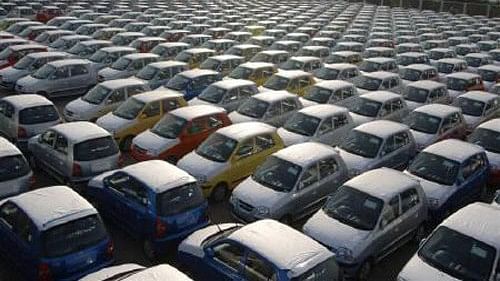
Car sales in India declined 1.03 per cent in September, after posting four months of consecutive growth, as customers postponed purchases during the month on account of festival season beginning in October.
Credit: Reuters file photo
Bengaluru: Inventory levels with dealers across the passenger vehicle (PV) segment have reached alarming levels, with stock days now stretching to 70-75 days.
The total inventory stands at 7.8 lakh vehicles, valued at Rs. 77,800 crore, as of last month, according to a report released by the Federation of Automobile Dealers Associations (FADA) on Thursday (September 5).
"Rather than responding to the situation, PV original equipment manufacturers (OEMs) continue to increase dispatches to dealers on a month-on-month (MoM) basis, further exacerbating the issue," said the report.
"Even with the arrival of the festive season, the market remains under significant strain due to delayed customer purchases, poor consumer sentiment and persistent heavy rains," the report added.
"FADA urgently calls upon all Banks and NBFCs to intervene and immediately control funding to dealers with excessive inventory. Dealers must also act swiftly to stop taking on additional stock to protect their financial health, " said Manish Raj Singhania, president, FADA.
"OEMs, too, must recalibrate their supply strategies without delay, or the industry faces a potential crisis from this inventory overload. If this aggressive push of excess stock continues unchecked, the auto retail ecosystem could face severe disruption," he added.
Passenger vehicle sales saw a year-on-year (YoY) decline of 4.53 per cent to 3,09,053 units, down from 3,23,720 units in the year-ago period. Sequentially, this segment saw a decline of -3.46 per cent.
While the two-wheeler (2W) and three-wheeler (3W) segments managed to post growth at 6.28 per cent and 1.63 per cent, respectively, on a YoY basis, other categories faced significant setbacks.
Besides the drop in PV sales, tractor sales dropped by 11.39 per cent YoY and commercial vehicles (CV) saw a 6.05 per cent YoY drop, underscoring the challenges the industry is grappling with, due to these volatile conditions.
The report attributed the decline to 'weather anomalies', which, according to the report, have had a direct impact on India's auto retail market, resulting in a modest year-over-year (YoY) growth of just 2.88 per cent.
Tractors and the 2W market, which are indicators of the rural economy's performance, saw an MoM decline of 7.29 per cent and 18.12 per cent respectively, largely due to excessive rains and flooding, which disrupted demand across various regions. Due to the reduced construction activity and sluggish demand in industrial sectors, CV sales experienced a sharp drop of 8.5 per cent MoM.
Citing the IMD's forecast of 16 per cent above-normal rainfall in August and additional rainfall for September, the report noted the risks arising from the excessive rainfall to crops nearing harvest which could negatively affect rural sales, as reduced agricultural output may lead to diminished purchasing power.
Additionally, the Shraddh period in September, regarded as an inauspicious time for purchases, is expected to pause sales for some time. In the CV segment, sluggish construction activity, liquidity issues and weather-related disruptions are likely to suppress demand further.
Aggressive discounting practices continue to pressure dealers, leading to reduced profitability and generally cautious market sentiment.